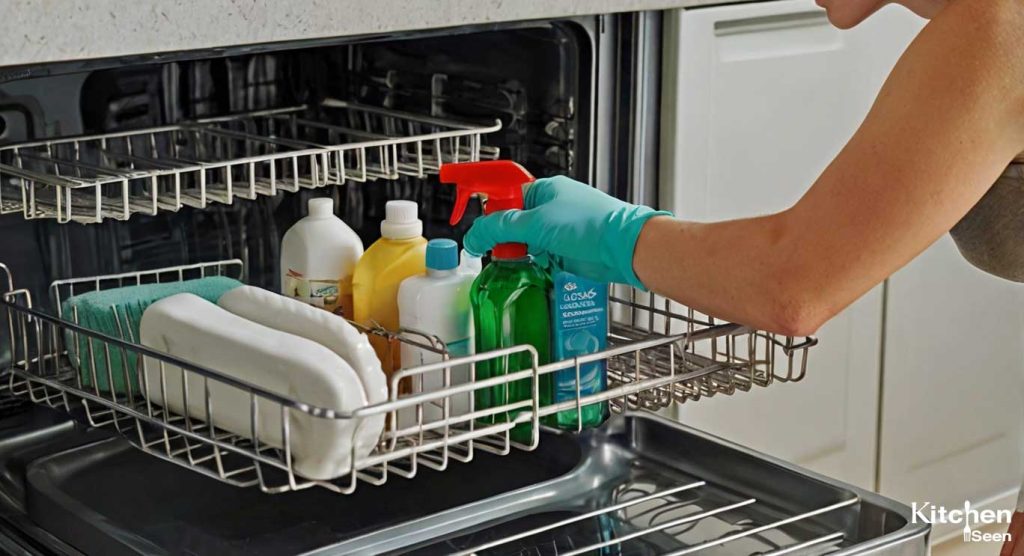
Keeping your dishwasher spotless is key to ensuring it performs efficiently and keeps your dishes sparkling. It’s an often overlooked task that can make all the difference. In this comprehensive guide, I’ll show you how to clean a dishwasher for the best results, tackle common issues like unpleasant odors, and answer some of the most frequently asked questions about dishwasher maintenance. Whether you’re a homeowner looking to maintain your kitchen appliances or an eco-friendly enthusiast aiming to keep everything running smoothly, this guide has you covered.
Why Cleaning Your Dishwasher Is Important
You might think that because your dishwasher cleans dishes, it cleans itself too. Unfortunately, that’s not the case. Mold and bacteria can grow in your dishwasher as a result of food parts, grease, and soap scum gathering over time. Not only does this create a less-than-pleasant odor, but it can also affect the performance of your dishwasher. A dirty dishwasher can’t clean your dishes effectively, leaving you with spots, stains, and a whole lot of frustration.
By regularly cleaning your dishwasher, you’ll prolong its lifespan and ensure it runs efficiently. This small investment of time and effort can save you money in the long run by avoiding costly fixes or the need for a replacement. Plus, who doesn’t love the feeling of opening a fresh, clean dishwasher?
Another important aspect to consider is your health. Those bacteria and mold spores lurking in your dishwasher can pose a risk to your family’s well-being. By keeping your dishwasher clean, you eliminate these potential hazards and create a healthier home environment.
How Often to Clean Your Dishwasher
Maintaining a consistent cleaning schedule is essential for keeping your dishwasher in top condition. But how frequently should you be cleaning it? The answer depends on how often you use your dishwasher and the type of dishes you wash.
If you run your dishwasher daily, aim to clean it thoroughly once a month. For those who use their dishwasher less frequently, a deep clean every two to three months should suffice. Additionally, it’s a good idea to do a quick wipe-down of the door and gasket after each use to prevent buildup.
For those who use their dishwasher to clean heavily soiled cookware like pots and pans, you may need to clean it more frequently. Grease and food particles can accumulate quickly and affect your dishwasher’s performance. Keep an eye out for signs that your dishwasher needs attention, such as unpleasant odors, water pooling at the bottom, or dishes that aren’t coming out as clean as they used to.
Step-by-Step Guide to Cleaning a Dishwasher
Ready to get started? Here’s a easy and simple, step-by-step guide to cleaning your dishwasher for spotless results:
Step 1: Gather Your Supplies
Before you begin, make sure you have the following items on hand:
- White vinegar
- Baking soda
- A toothbrush (an old one works great)
- A soft cloth or sponge
- Dish soap
- Toothpick or other small, pointed tool
Step 2: Empty the Dishwasher
Take off all dishes, utensils, and racks from your dishwasher. This will give you clear access to all the nooks and crannies that need cleaning.
Step 3: Clean the Filter
Find the filter at the bottom of your dishwasher. Remove it according to your manufacturer’s instructions and rinse it thoroughly under hot water. Use a toothbrush to scrub away any stubborn debris. If your filter is particularly dirty, in a dish soap and warm water mixture for 15 minutes before scrubbing.
Step 4: Wipe Down the Interior
Using a sponge or soft cloth, wipe down the interior walls, door, and gasket of your dishwasher. Take extra care in any areas where buildup is evident. For tough spots, dip your cloth or sponge in a dish soap and warm water solution. Don’t forget to clean around the door seal, where grime can accumulate over time.
Step 5: Clean the Spray Arms
The spray arms are crucial for delivering water to your dishes, so it’s important to keep them clean. Remove the spray arms if possible and inspect the holes for clogs. Use a toothpick or small, pointed tool to clear any debris from the holes. Rinse the spray arms under hot water and reattach them to the dishwasher.
Step 6: Run a Vinegar Cycle
A cup of white vinegar in a dishwasher-safe container on your dishwasher’s top rack when it’s empty. Run a hot water cycle to help break down any remaining grime and remove odors. The vinegar will also help sanitize your dishwasher.
Step 7: Add Baking Soda
After the vinegar cycle is finished, sprinkle a cup of baking soda all over the interior and across bottom of the dishwasher. Run a short, hot water cycle to further deodorize and freshen up the interior. The baking soda will help remove any lingering stains and leave your dishwasher smelling clean.
How to Clean a Dishwasher Smelly
A smelly dishwasher can be a real nuisance, but it’s a common issue that can be easily resolved with a few simple steps. Here’s how to tackle those unpleasant odors:
Identify the Source
First, determine where the smell is coming from. It could be the filter, the gasket, or even trapped food particles in the spray arms. By identifying the source, you can target your cleaning efforts more effectively.
Deep Clean the Filter
A dirty filter is often the culprit behind dishwasher odors. Follow the steps outlined earlier to clean your filter thoroughly. Make sure to check it regularly and keep it clean to prevent future smells.
Use Natural Deodorizers
In addition to the vinegar and baking soda cycles mentioned earlier, you can also use natural deodorizers like lemon juice or citrus peels. Place a few lemon slices or citrus peels in your dishwasher and run a short cycle to freshen up the interior.
Keep It Dry
Moisture can contribute to unpleasant odors, so it’s important to keep your dishwasher as dry as possible. After each use, leave the door slightly ajar to allow air circulation and prevent mold and mildew growth.
Special Considerations for Different Dishwasher Brands
Different dishwasher brands may have specific cleaning requirements or features that you should be aware of. Here are some tips for cleaning dishwashers from a few popular brands:
Bosch Dishwashers
Bosch dishwashers are known for their efficiency and quiet operation. To keep your Bosch dishwasher in top shape, follow these additional tips:
- Use a Bosch-approved descaler to remove hard water deposits.
- Clean the stainless steel interior with a damp cloth and mild detergent.
- Regularly check and clean the drainage pump to prevent clogs.
Amana Dishwashers
Amana dishwashers are budget-friendly and reliable. To maintain your Amana dishwashe, consider these tips:
- Use a dishwasher cleaner specifically designed for hard water areas.
- Run hot water in your sink before starting the dishwasher to ensure optimal cleaning performance.
- Inspect and clean the door gasket regularly to prevent leaks.
General Tips for All Brands
Regardless of the brand, there are some general tips you can follow to keep your dishwasher clean and running smoothly:
- Avoid overloading your dishwasher, as this can prevent proper water circulation.
- Before putting dishes in the dishwasher, scrape off any extra food.
- Use a high-quality dishwasher detergent to prevent buildup and improve cleaning performance.
Conclusion
Regular dishwasher cleaning is an essential part of maintaining a healthy, efficient kitchen. By following the steps outlined in this guide, you can ensure your dishwasher stays in top condition and continues to provide spotless results. Remember to clean your filter, use natural deodorizers, and keep an eye out for any signs of buildup or odors.
If you think this guide helpful, consider sharing it with your friends and family. And if you have any additional tips or questions, feel free to leave a comment below. Happy cleaning!
Read Our Popular Blog
Can I Use Bleach to Clean My Dishwasher?
While bleach can be an effective cleaner, it’s not recommended for dishwashers with stainless steel interiors or parts. Bleach can cause damage and discoloration. Instead, stick to natural cleaners like vinegar and baking soda, which are safe for all dishwasher types.
How Do I Prevent Mold and Mildew in My Dishwasher?
While bleach can be an effective cleaner, it’s not recommended for dishwashers with stainless steel interiors or parts. Bleach can cause damage and discoloration. Instead, stick to natural cleaners like vinegar and baking soda, which are safe for all dishwasher types.
How Do I Prevent Mold and Mildew in My Dishwasher?
To prevent mold and mildew, make sure your dishwasher is thoroughly dry after each use. Leave the door slightly open to allow air circulation, and consider running a vinegar cycle once a month to sanitize the interior. Regularly cleaning the filter and gasket will also help prevent mold and mildew growth.
Is It Safe to Clean My Dishwasher with Commercial Cleaning Products?
Yes, commercial dishwasher cleaners are generally safe to use and can be very effective. Just be sure to follow the manufacturer’s instructions and choose a product that is compatible with your dishwasher brand and model. Always run an empty cycle with the cleaner to avoid any potential residue on your dishes.
